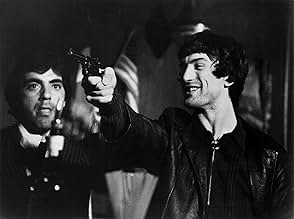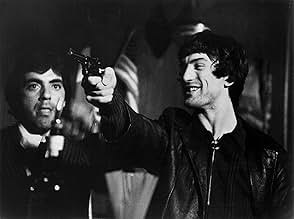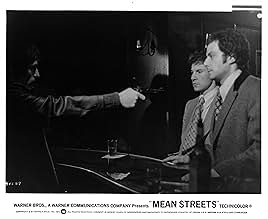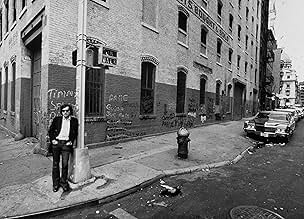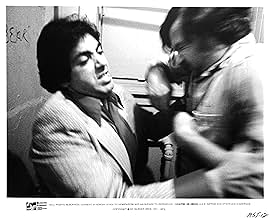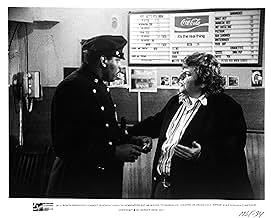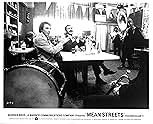Ein Kleinkrimineller arbeitet sich innerhalb der örtlichen Mafia nach oben.Ein Kleinkrimineller arbeitet sich innerhalb der örtlichen Mafia nach oben.Ein Kleinkrimineller arbeitet sich innerhalb der örtlichen Mafia nach oben.
- Auszeichnungen
- 5 Gewinne & 5 Nominierungen insgesamt
Victor Argo
- Mario
- (as Vic Argo, Victor Argo)
Murray Moston
- Oscar
- (as Murray Mosten)
What Scorsese Film Ranks Highest on IMDb?
What Scorsese Film Ranks Highest on IMDb?
Cinema legend Martin Scorsese has directed some of the most acclaimed films of all time. See how IMDb users rank all of his feature films as director.
Handlung
WUSSTEST DU SCHON:
- WissenswertesFrancis Ford Coppola contributed money to the budget of the film. However, it is rumored that he lent Martin Scorsese $3000 as the Mafia shook him down for using the San Genaro Festival as a backdrop without "permission". It's generally presumed he Mafia uses the all-cash festival to launder money from their ill-gotten gains.
- PatzerThe end credits on the DVD incorrectly list David Carradine as "Oscar" and Robert Carradine as "Drunk".
The end credits in the movie are correct. Per IMDb Guidelines, errors in a DVD have nothing to do with the filmmakers; as such, they are not acceptable as goofs.
- Zitate
[first lines]
Voice in Charlie's Mind: You don't make up for your sins in church. You do it in the streets. You do it at home. The rest is bullshit, and you know it.
- Alternative VersionenNBC edited 10 minutes from this film for its 1977 network television premiere.
- VerbindungenEdited into American Cinema: Film Noir (1995)
- SoundtracksJumpin' Jack Flash
Written by Mick Jagger (as M. Jagger), Keith Richards (as K. Richards) (uncredited)
By The Rolling Stones
Courtesy of ABKCO Records
Ausgewählte Rezension
Scorsese's first film, the interesting catastrophe "Boxcar Bertha," marked his birth as a director, but it was with his second feature, "Mean Streets" that we witnessed the birth of an artist. Most of "Mean Streets" is slightly unfocused with a simplistic plot based around a lot of machismo grandstanding and long bouts of boring dialog (occasionally made interesting by DeNiro's off-kilter star-making turn as Johnny-Boy), with spats of visceral violence (far less gory here than in later Scorcese pics), and a visual bravado that seems slightly less disciplined but no less entertaining than your standard Scorsese crime flick.
Despite its drawbacks (mainly due to youth and inexperience), the template was set. The opening credits (done to the tune of "Be My Baby") suck you right into the film, and the rest of the movie is peppered with Scorsese's loving treatment of popular music that would later become one of his most endearing hallmarks. The basic premise featuring Harvey Keitel as Charlie (the young hood with a heart of gold and conflicted internally by the religion of the Church and the religion of the Streets), Robert DeNiro as Johnny-Boy (the equally loved and hated loose-canon brother figure), and Amy Robinson as Theresa (the woman our hero wants to put on a pedestal as a saint but often treats like a whore), is a trifecta of archetypes we see repeated again and again in Scorsese's films (most obviously in "Casino" with the DeNiro-Pesci-Stone characters, and most subversively in "The Last Temptation of Christ" with Jesus-Judas-Mary Magdalene). The religious iconography, the brotherhood of crooks, the attraction to the gangster lifestyle, the keen eye for depicting violence in artistic and startling ways...these are displayed here in "Mean Streets" in their rawest form.
Though flawed in many ways, "Mean Streets" set the stage and laid the the template for the type of film Scorsese would perfect seventeen years later with "Goodfellas." This heralded the arrival of a new talent and a new genre, and the world of film has thankfully never been the same.
Despite its drawbacks (mainly due to youth and inexperience), the template was set. The opening credits (done to the tune of "Be My Baby") suck you right into the film, and the rest of the movie is peppered with Scorsese's loving treatment of popular music that would later become one of his most endearing hallmarks. The basic premise featuring Harvey Keitel as Charlie (the young hood with a heart of gold and conflicted internally by the religion of the Church and the religion of the Streets), Robert DeNiro as Johnny-Boy (the equally loved and hated loose-canon brother figure), and Amy Robinson as Theresa (the woman our hero wants to put on a pedestal as a saint but often treats like a whore), is a trifecta of archetypes we see repeated again and again in Scorsese's films (most obviously in "Casino" with the DeNiro-Pesci-Stone characters, and most subversively in "The Last Temptation of Christ" with Jesus-Judas-Mary Magdalene). The religious iconography, the brotherhood of crooks, the attraction to the gangster lifestyle, the keen eye for depicting violence in artistic and startling ways...these are displayed here in "Mean Streets" in their rawest form.
Though flawed in many ways, "Mean Streets" set the stage and laid the the template for the type of film Scorsese would perfect seventeen years later with "Goodfellas." This heralded the arrival of a new talent and a new genre, and the world of film has thankfully never been the same.
- WriterDave
- 1. Jan. 2007
- Permalink
Top-Auswahl
Melde dich zum Bewerten an und greife auf die Watchlist für personalisierte Empfehlungen zu.
Details
- Erscheinungsdatum
- Herkunftsland
- Offizieller Standort
- Sprachen
- Auch bekannt als
- Die besten Regisseure der Welt
- Drehorte
- Produktionsfirmen
- Weitere beteiligte Unternehmen bei IMDbPro anzeigen
Box Office
- Budget
- 500.000 $ (geschätzt)
- Bruttoertrag in den USA und Kanada
- 32.645 $
- Eröffnungswochenende in den USA und in Kanada
- 32.645 $
- 15. März 1998
- Weltweiter Bruttoertrag
- 61.676 $
- Laufzeit1 Stunde 52 Minuten
- Farbe
- Seitenverhältnis
- 1.85 : 1
Zu dieser Seite beitragen
Bearbeitung vorschlagen oder fehlenden Inhalt hinzufügen






